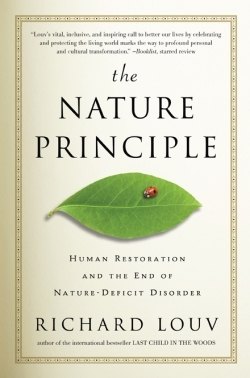
The Nature Principle
Human Restoration and the End of Nature-Deficit Disorder
In his latest book, journalist Richard Luov outlines the ways adults are also at risk for “nature-deficit disorder,” a condition he described at length in the national bestseller Last Child in the Woods. Because our over-busy and electronically mediated lives estrange us from the natural world and its benefits, he offers a vision for a future based on what he terms the “Nature Principle,” in which we mend that rift and restore our right relationship with the outdoors for the sake of our health, creativity, spiritual well-being, and basic survival. This is a philosophical project founded on a vast body of academic and other research into the power of nature to bring us to our senses, strengthen our bodies and minds, and fortify families and social networks.
Luov offers seven precepts for such a transformation. For example, he suggests we cultivate a “hybrid mind,” thereby utilizing nature and technology in ways that foster creativity, intelligence, and increased productivity; he discusses the usefulness of “biophilic design” in all aspects of our built and social environment; and he writes about the health benefits of Vitamin N, otherwise known as the mind/body/nature connection. In the simplest terms, he proclaims that nature helps us enjoy our lives more fully by opening “doors to health, creativity, and wonder.”
Conversely, if we are out of touch with nature, we lose a form of sensitivity linked to humility, and with that loss, some of our instincts for spiritual and physical survival. Luov argues that “a denatured life is a dehumanized life,” and a life in which nature plays a vital part is markedly healthier. Studies find that children who live near green spaces have a lower body mass index when compared to those who don’t; and there is a mountain of evidence that nature is also a powerful antidote to other health conditions, including depression, dementia, high blood pressure, and memory loss.
Luov’s proposal is for a “renaturing of everyday life,” and his lively discussion of how to accomplish this is likely to inspire many readers. His is not a doomsday prognosis but rather an inspired prescription for health, happiness, and a world in which humans and nature are in alignment. He envisions citizen naturalists mapping their surroundings and public health policies that acknowledge the health benefits of nature; he calls for cities, hospitals, schools, and homes to integrate design principals that embrace nature.
His last book spurred a movement to get kids outside because to do otherwise “threatens our health, our spirit, our economy and our future stewardship of the environment.” Based on the timeliness and breadth of Luov’s research, it seems likely that The Nature Principle will build on that momentum and change more than a few lives for the better.
Reviewed by
Holly Wren Spaulding
Disclosure: This article is not an endorsement, but a review. The publisher of this book provided free copies of the book to have their book reviewed by a professional reviewer. No fee was paid by the publisher for this review. Foreword Reviews only recommends books that we love. Foreword Magazine, Inc. is disclosing this in accordance with the Federal Trade Commission’s 16 CFR, Part 255.
